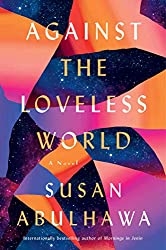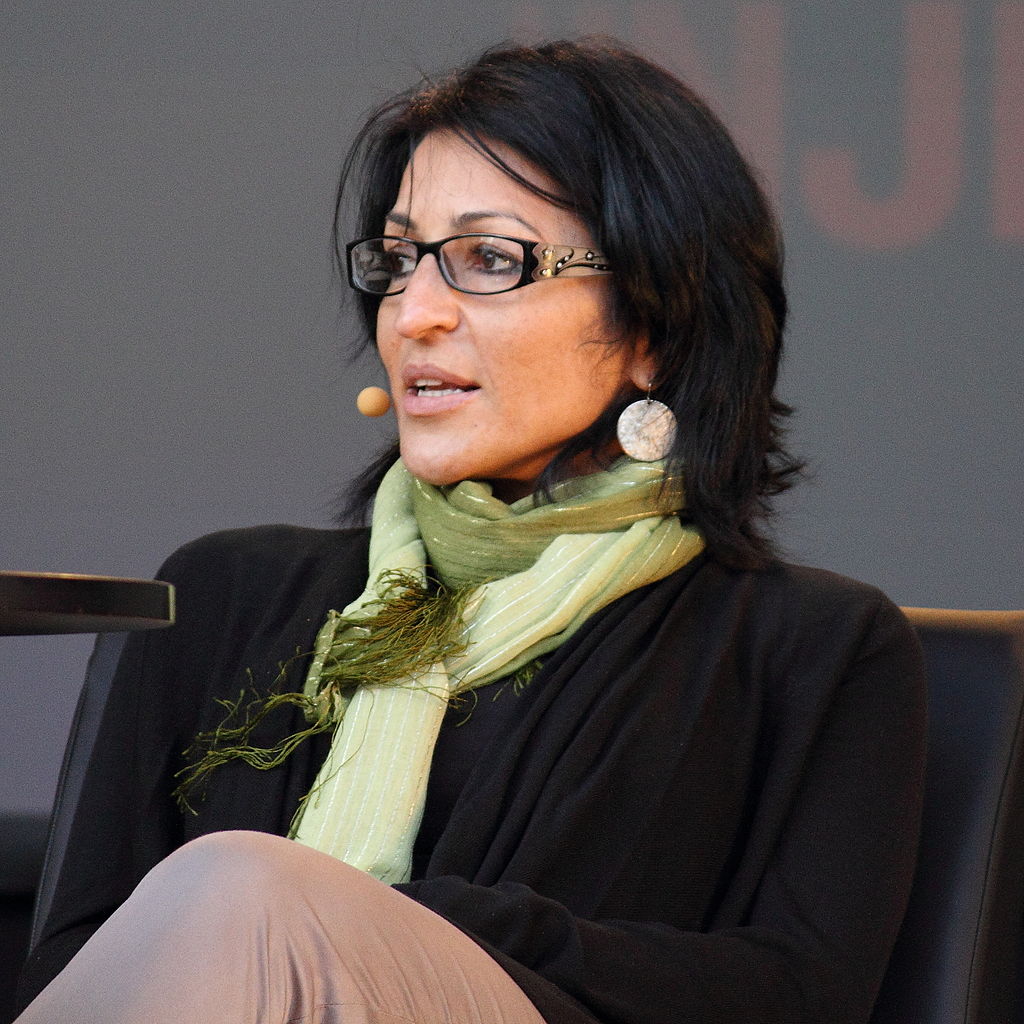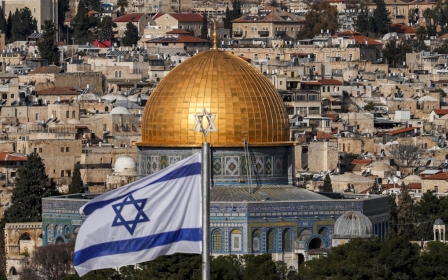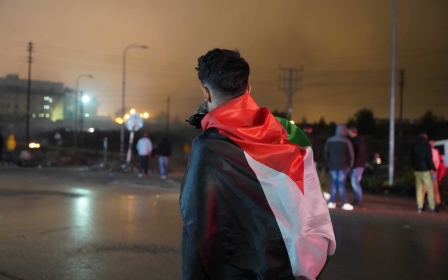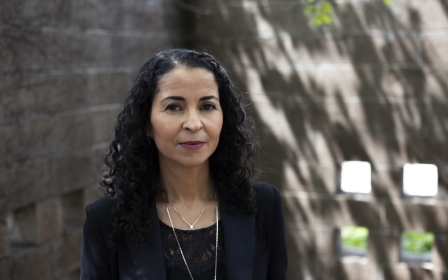Against the Loveless World: A Palestinian tale of exile and resistance

Editor's note: The following article contains spoilers of the novel, Against the Loveless World.
When Nahr, the thirty-something Palestinian protagonist of Susan Abulhawa’s new novel Against the Loveless World, is tried in an Israeli court, the trial is conducted entirely in Hebrew; Nahr doesn’t find out until she’s in jail what the nature of her alleged crime is.
As the trial takes place near the end of the book, the reader is already sufficiently acquainted with Nahr’s individualistic personality - and the pleasure she derives in throwing Israelis in particular for a loop by behaving in unconventional fashion - that her comportment in the courtroom doesn’t come as a great shock. She launches into a medley of Arabic songs, hoping to make her husband Bilal - himself a frequent prisoner of Israel and a model of defiance - proud, wherever he is:
"I started with ‘Yumma Mweil elHawa,’ to set the mood. The judge admonished me. I waited a while, then sang every Abdel Halim Hafez song I could think of. ‘El Hawa Hawaya’ followed by my favorite, ‘Qariatol Fingan.’ The judge was baffled, then irate, yelling at me, at the prosecutors, lawyers, bailiffs. She ordered the guards to silence me."
As she sings, Nahr - the first-person narrator of the book - summarises the function of her performance for the reader: “I colonised the coloniser’s space of authority. I made myself free in chains and held that courtroom captive to my freedom.”
New MEE newsletter: Jerusalem Dispatch
Sign up to get the latest insights and analysis on Israel-Palestine, alongside Turkey Unpacked and other MEE newsletters
It turns out that Nahr’s words are fitting beyond the immediate context, as Against the Loveless World itself constitutes a defiance of colonising narratives and a reclaiming of Palestinian space - by both Abulhawa and her characters.
A Palestinian-American writer, human rights activist and biologist, Abulhawa hails from Jerusalem and currently resides in Pennsylvania. She is the author of several books, including The Blue Between Sky and Water and her acclaimed first novel, Mornings in Jenin - about various generations of a Palestinian refugee family - which has been published in more than 30 languages and sold over a million copies worldwide. Abulhawa is also the founder of Playgrounds for Palestine, an organisation that builds recreational spaces for children under Israeli occupation.
From her writings and public appearances, Abulhawa seems - much as the fictional Nahr does - as someone who doesn’t take nonsense from anyone, regardless of the effects on personal reputation or career. Case in point: some years ago she publicly took on Alan Dershowitz, Harvard Law School’s former resident cheerleader for Israeli war crimes, at the Boston Book Festival in 2010, calmly and collectedly tearing him and his arguments to pieces.
The Cube
Against the Loveless World is divided into seven sections, each one beginning with a scene from the Cube, the “technological marvel” where Nahr is imprisoned at the conclusion of her trial - an almost completely automated solitary cell, which has made her “famous in ‘security circles’ - private prison corporations, surveillance tech companies, and various ancillary suppliers of bondage.”
Her crime, of course, is revealed to be “terrorism” - as if the Israeli political imagination allowed for anything else.
Following each incarcerated introduction, we return to filling in the trajectory of Nahr’s life. Her mother, a 1948 refugee from Haifa, is pregnant when Israel once again makes her a refugee in 1967. She flees with her husband across the River Jordan at the Allenby Bridge, which collapses:
"Mama told me: ‘I just prayed to God as your father and I crossed, and I made a deal with the river. I said I’d name you after it if it didn’t swallow any of us.’ … But calling me Jordan would have been too strange. That’s how I got the name Nahr. River."
Nahr (like Abulhawa) grows up in Kuwait, where the sizable Palestinian refugee population is given only temporary residency and remains an underclass. But she loves it: “It was my home, and I was a loyal subject of the royals.”
She marries Mhammad, who arrives in Kuwait upon being released from Israeli prison and is touted as a resistance hero - although we learn later that his imprisonment actually had to do with events that transpired in the context of his relationship with a male Israeli soldier named Itamar (whom he calls “Tamara”).
He abandons Nahr and runs back to, she assumes, a woman named Tamara - thereby destroying her fairytale notions of love and marriage and setting the stage for a fraught future with men.
For writers of Abulhawa’s calibre, it’s difficult to pick what it is that they do best. But you know they’re doing something - or many things - right when you consistently find yourself pausing to contemplate the thought process that went into composing a certain sentence, or developing a certain character, or describing a simple phenomenon in a novel way.
Nahr then falls in with an older Kuwaiti woman called Um Buraq, who approaches her after seeing her dance at a wedding and who runs a prostitution business of sorts. Unwittingly initiated into the group and then blackmailed by Um Buraq into staying, she determines to use her income from these activities and her other jobs to put her brother through university.
About “what people who don’t know better call ‘belly dancing,’” Abulhawa writes: “Our dance is about chaos and anarchy. It is the antithesis of control. It’s about relinquishing power over one’s body, bestowing autonomy on every bone, ligament, nerve, and muscle fibre. On every skin and fat cell. Every organ.”
As for Nahr’s relinquishment of her body to men, Abulhawa excels at conveying the assorted layers of conflict: “Each bought a little piece of me and took it away forever. I remember them all.”
On 2 August 1990, Um Buraq sends Nahr to dance at a party for Saudi military officers, where she is ultimately rescued from gang rape when Iraq invades Kuwait. “Saddam Hussein had saved my life that night, and for the duration of Iraq’s presence in Kuwait, I was a liberated, happy woman.”
Nahr observes that 'going from place to place is just something exiles have to do. Whatever the reason, the earth is never steady beneath our feet'
Things quickly go downhill, however, with the American invasion and the Iraqi withdrawal, after which Kuwait sets about punishing its Palestinian population for PLO leader Yasser Arafat’s decision to side with Saddam. Nahr’s brother is detained by security forces and loses an eye. Following his release, the family leaves for Jordan, refugees once again.
Nahr observes that “going from place to place is just something exiles have to do. Whatever the reason, the earth is never steady beneath our feet”.
In her case, of course, the reason is Israel, which in addition to physically usurping the land from beneath Palestinian feet has also sought to eradicate the very concept of Palestinian-ness - a fundamentally genocidal effort to erase not only the space in which Palestinians can be, but also their very right to be in the first place. Unfortunately for Israel, human populations do not give up that right all too easily.
In Amman, Nahr’s mother makes a name for herself embroidering wedding thobes, prompting Nahr to reflect:
"I had to become another person, someone at the other end of disgrace, rape, and exile, to fully appreciate that my mother, a simple widow with an elementary education, was an extraordinary artist. My mother was a maker of beauty, a brilliant custodian of culture and history."
When a thobe is eventually required for Nahr’s second wedding - this one to Mhammad’s brother Bilal, a scrupulous member of the Palestinian resistance - Mama explains her handiwork as an act of resistance in itself: “I thought a lot about this and decided to use the basic patterns of a Jerusalem thobe, because we’re being erased from her story and her stone.”
Homecoming
The introduction to Bilal comes about thanks to the - otherwise disastrous - Oslo Accords of 1993, which allow Nahr to recuperate her Palestinian identity document and travel to Palestine to secure her divorce from Mhammad.
Her homecoming begins with the obligatory punitive interrogation and six-hour wait on the Jordanian-Palestinian border, after which she takes in the landscape and her breathing deepens.
Memories of childhood trips and stories from family members and neighbours, even the “ones I thought I’d discarded, tuned out, dismissed… were all there to greet me, enfolding me in the embrace of our collective dislocation from this place where all our stories go and return”.
She continues, marking the act of return as a reclaiming of territory and history and an affirmation of the Palestinian-ness Israel has tried so hard to stamp out. “Here is where we began. Where our songs were born, our ancestors buried.” The adhan sounds: “It floated through me, raised the hair on my arms, made me close my eyes and inhale the call to prayer.”
Nahr stays with Bilal and his mother in the West Bank, where Jewish settlers have set up shop on the family’s land. Bilal has just been released from Israeli jail under the Oslo agreement and takes her on long walks, teaching her about the various plants they encounter and their “associated folklore, culinary uses, and medicinal value”.
They pick wild za’atar together, and the occasional pomegranate. “Life didn’t grow wild like this in Kuwait, or Amman.” Indeed, one area in which Abulhawa undoubtedly excels is conveying the centrality of the land and agriculture to Palestinian existence - an intrinsic link that Israel has not via any quantity of bombs and bulldozers managed to uproot.
Then there are the family’s olive groves, which, particularly during harvest time, are a target for armed attacks and pyromania by settlers and soldiers. As for other agricultural etiquette by the self-proclaimed bloomers of the desert, “Israel rationed water to Palestinians, especially farmers, and would then move in to confiscate farms and groves of dying trees for being neglected”.
Nahr is gradually incorporated into resistance activities, and for a moment it seems that Palestine will be the place where the earth is at last steady beneath her feet
In order to save his own dying almond trees, Bilal manages to divert water from the settlement - a procedure requiring Nahr to connect tubing in the dark while he sets off firecrackers to distract the soldiers in the area. The firecrackers get him arrested once again, but the almond trees live.
Bilal also has a flock of sheep and goats, cared for by a shepherd named Jandal - until Jandal is shot by the Israeli military. Nahr grieves: “Jandal had given continuity to an ancient Palestinian tradition. That was also disappearing, and maybe it was the point of killing Jandal and his animals. He knew those hills like he knew his own body.”
Nahr is gradually incorporated into resistance activities, and for a moment it seems that Palestine will be the place where the earth is at last steady beneath her feet. But her family remains in Jordan and, while Palestine “was where I belonged… so much of me was still scattered elsewhere”. This, she says, “was what it meant to be exiled and disinherited - to straddle closed borders, never whole anywhere. To remain in one place meant tearing one’s limbs from another”.
Against the loveless world
In Bilal, meanwhile, Nahr finds what she had never thought possible with a man: an “emotional intimacy [that] was shattering my heart in the most life-affirming ways”. The title of the book, Against the Loveless World, is a reference to a line in an essay by James Baldwin that Bilal reads to Nahr during their “honeymoon” under curfew in the spring of 2002, as Israel goes about wreaking havoc across the West Bank and perpetrating a massacre in Jenin.
In the essay, a letter to his nephew Big James, Baldwin writes, describing Big James’ birth: “Here you were: to be loved. To be loved, baby, hard, at once, and forever, to strengthen you against the loveless world.”
Not long thereafter, Nahr is in jail and Bilal is MIA.
Abulhawa’s novel is a gripping one, with characters who are all the more human in their complexities and contradictions; Bilal, for example, is a communist who also goes to the mosque (in the Cube, Nahr requests a book on communism and is charitably given How Communism Will Destroy Humanity).
To be sure, there’s also no shortage of refreshingly irreverent commentary (“He can have at it, the whore son of a whore. Fuck his mother’s pussy”). And the acknowledgements section - a tearjerker in itself, in light of the details Abulhawa reveals about her own family and past - makes the story resonate even more profoundly.
In a couple of instances, it’s possible that a bit more subtlety might have proven more effective - as when Nahr and a dying Um Buraq are pondering, in the manuscript’s final pages, what it means that they both ended up imprisoned, and Nahr speculates that “maybe it just proves the state will always find a way to imprison those who are truly free, who do not accept social, economic, or political chains”.
Abulhawa herself clearly has no time for chains. And as the world remains loveless as ever, at least there are books like this one to strengthen us.
Against the Loveless World by Susan Abulhawa is available from Bloomsbury and was shortlisted for the Palestine Book Award
Middle East Eye delivers independent and unrivalled coverage and analysis of the Middle East, North Africa and beyond. To learn more about republishing this content and the associated fees, please fill out this form. More about MEE can be found here.


